Assassin’s Creed Mirage
Written by - Codiak
Updated: October 9, 2023
|
Posted: October 5, 2023

If you’ve been quietly sitting back waiting to see what this new Assassin’s Creed brings to the table, you’re not alone. I too have been cautiously optimistic about Mirage and the developers desire to pay tribute to the essence of the first game. What exactly that meant going into the game I had no idea, but I found out quick enough.
So here’s the headline. Assassin’s Creed Mirage is a true return-to-form experience for fans of the original games in the series. It combines a lot of the old, with some of the new, with a heavy emphasis on story, stealth action, and just enough discovery to keep me engaged. If you hated everything about the overly fantastical experiences of the more RPG-focused entries, Assassin’s Creed Origins, Odyssey, and Valhalla, you’ll most likely enjoy the more grounded experience of Mirage. Does it innovate in any major way, I’d argue not, but it pulls together all the disparate threads of the past and the present to create a gameplay experience that I think most people will enjoy. As always though we need to dive deeper.
Story-Centric Experience
Assassin’s Creed Mirage strips away a lot of the RPG elements that people disliked about the previous games. It’s not that they didn’t work, but the ridiculous skill trees that ultimately lead to a god-like Eivor just didn’t feel like an Assassin’s Creed experience, so the team made a choice to pivot to something different. In Mirage you play as Basim, before the events of Assassin’s Creed Valhalla. The game is entirely built around story, and while there are the usual side activities that pop up around Baghdad the focus of the game is investigating a group of Order of the Ancient members that are plaguing the city.
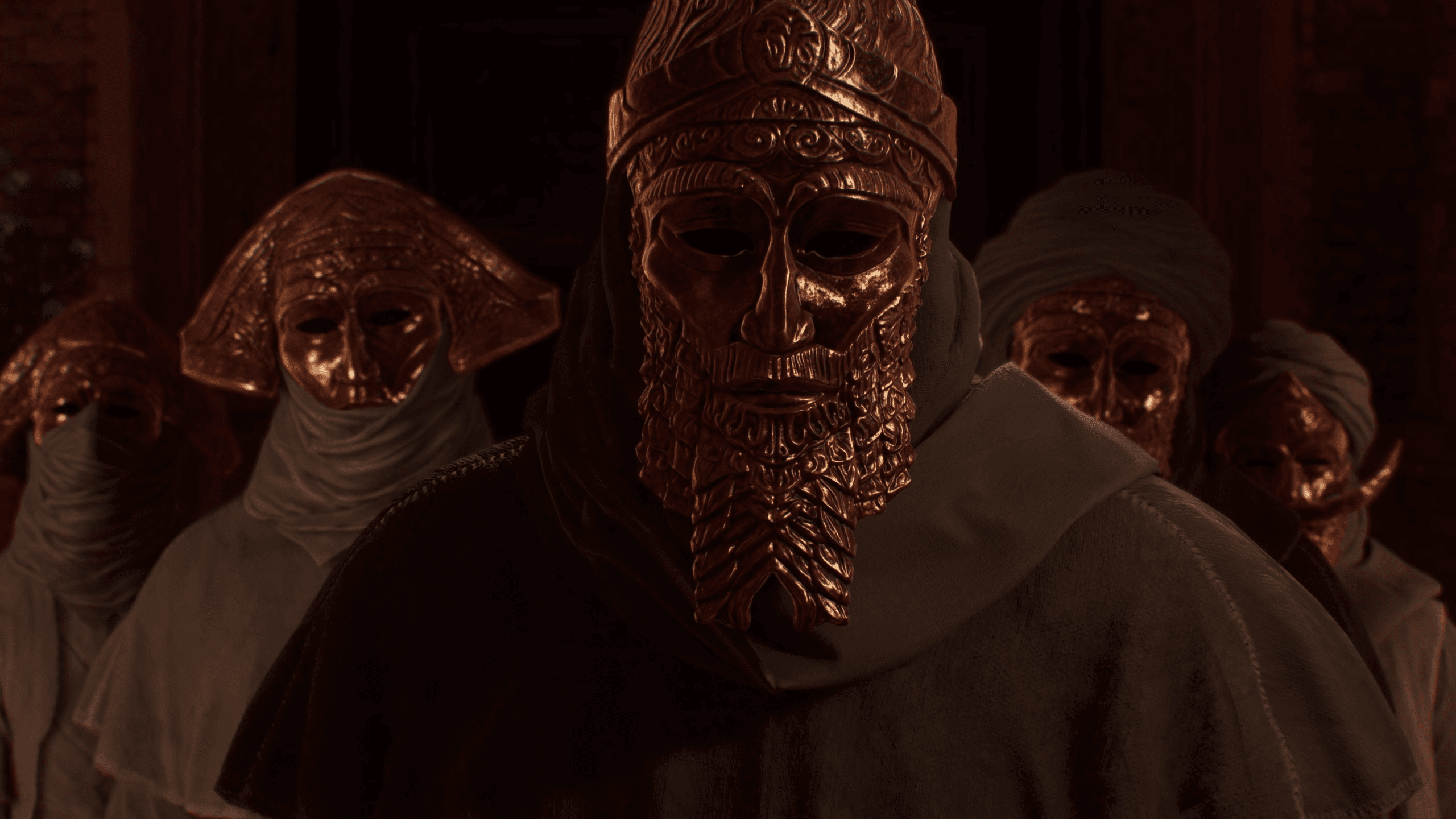
Instead of killing enemies and gaining XP the team did away with the leveling system entirely, tying all of your progression to story, which plays out really well. As you reach milestones along your adventure, you’ll gain a skill point or two and you can use that to allocate points into 3 relatively limited skill trees. In my opinion this is exactly what the team needed to do. As I’ve said in the past, if you’re going to have a skill progression system you need to tie it to meaningful changes in the way a character interacts with the world. The team nails that this go around.
Basim has access to 3 skill trees each with under 10 skills to invest points into.
Phantom Tree focuses on stealth and combat enhancements
The Trickster Tree focuses on tools and pickpocketing
The Predator Tree focuses on stealth and recon
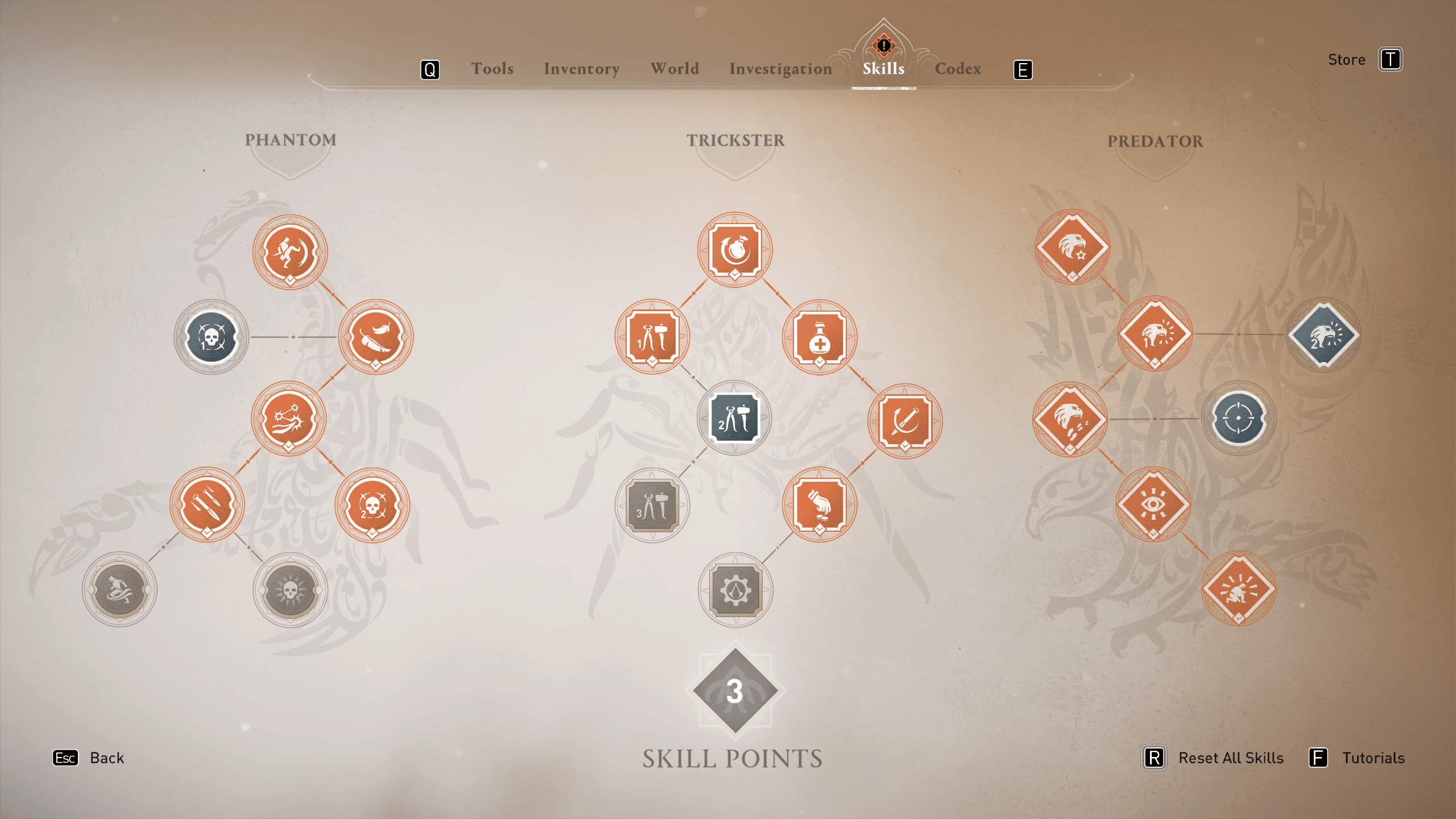
The fluff and filler are all stripped away and what you’re left with are the things that matter, and it ends up defining your gameplay experience. With less skills comes a quicker power curve and once you have a few key capabilities the game really does become a lot easier, but honestly that never stopped me from having a good time. By the end of my experience, I was an assassin that could move quickly, strike fast, but still remained in the shadows to prevent an all-out-skirmish.
Now I mentioned the story-centric experience and I think that’s going to be the biggest change for players stepping into this new game. It really feels like we’re going back in time and playing a modern version of the first game because everything in Mirage is tied to investigations. You start each leg of the journey at a new Hiddens One bureau, gather intel from the team, and then go out and untangle the threads that eventually lead you to a member of the Order of the Ancients. It’s still, for the most part, go here, do this, but there’s a greater emphasis on recon and intelligence gathering which feels more akin to the original experience.
For starters Enkidu, your falcon plays a much more central role to navigating the world, and while that was the case in Valhalla because the world is more compact in Baghdad, having that aerial viewpoint is really helpful. The game doesn’t outright show you everything, you’ll need to use Enkidu to locate potential weak points in defenses, or just opportunities to move the gameplay along, and while this isn’t a deep system by any stretch, it’s more engaging that the previous system. So here again little tweaks to something that didn’t quite click in Valhalla to make them better in Mirage. At some points in the game you’ll even find yourself reliving some of those classi c AC1 recon moments like tailing an informant and tracking them back to an area of interest, and while they’re not overwhelming, the one of two times I did have to do it I couldn’t help but think back to my time with the first game.
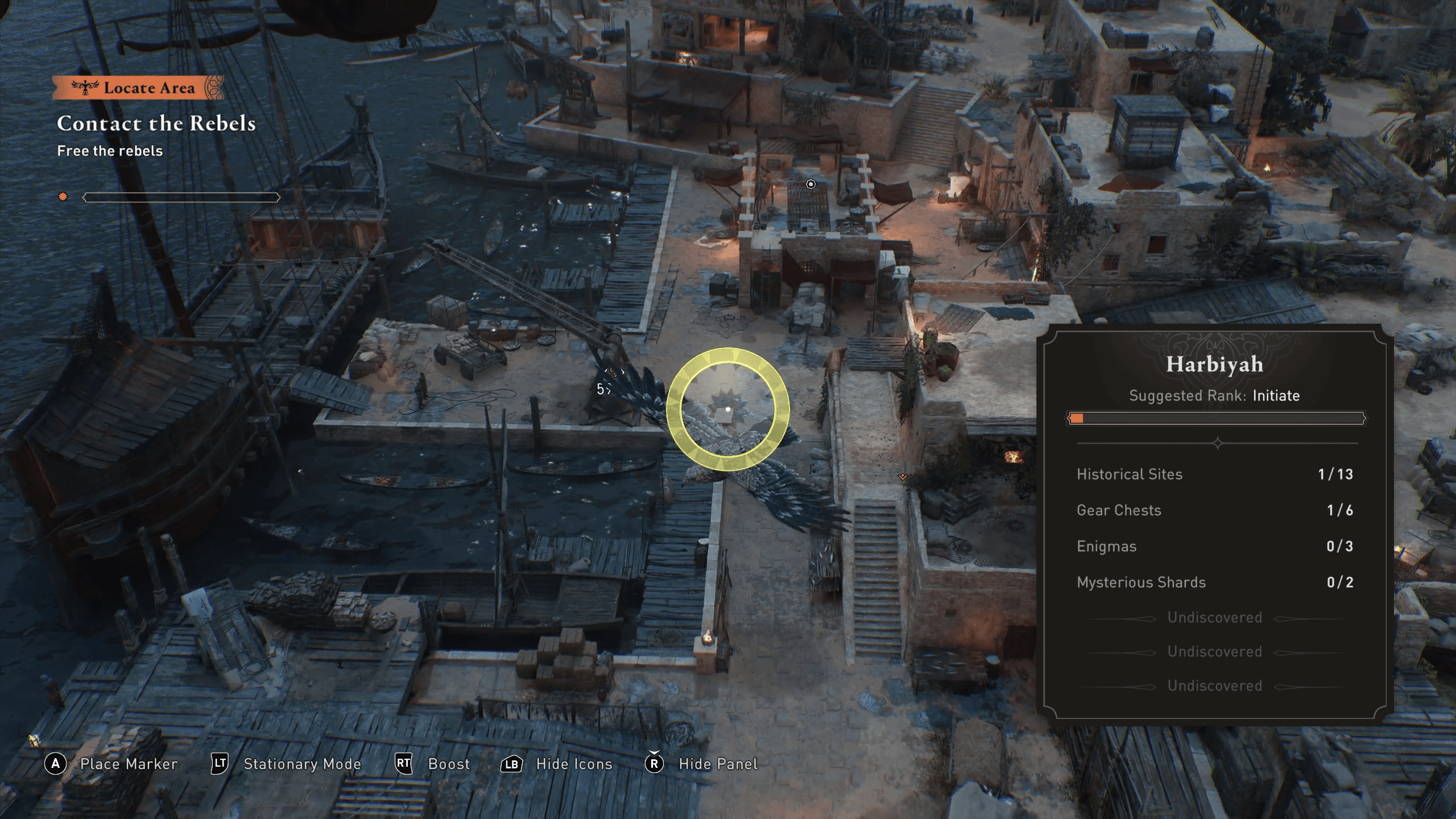
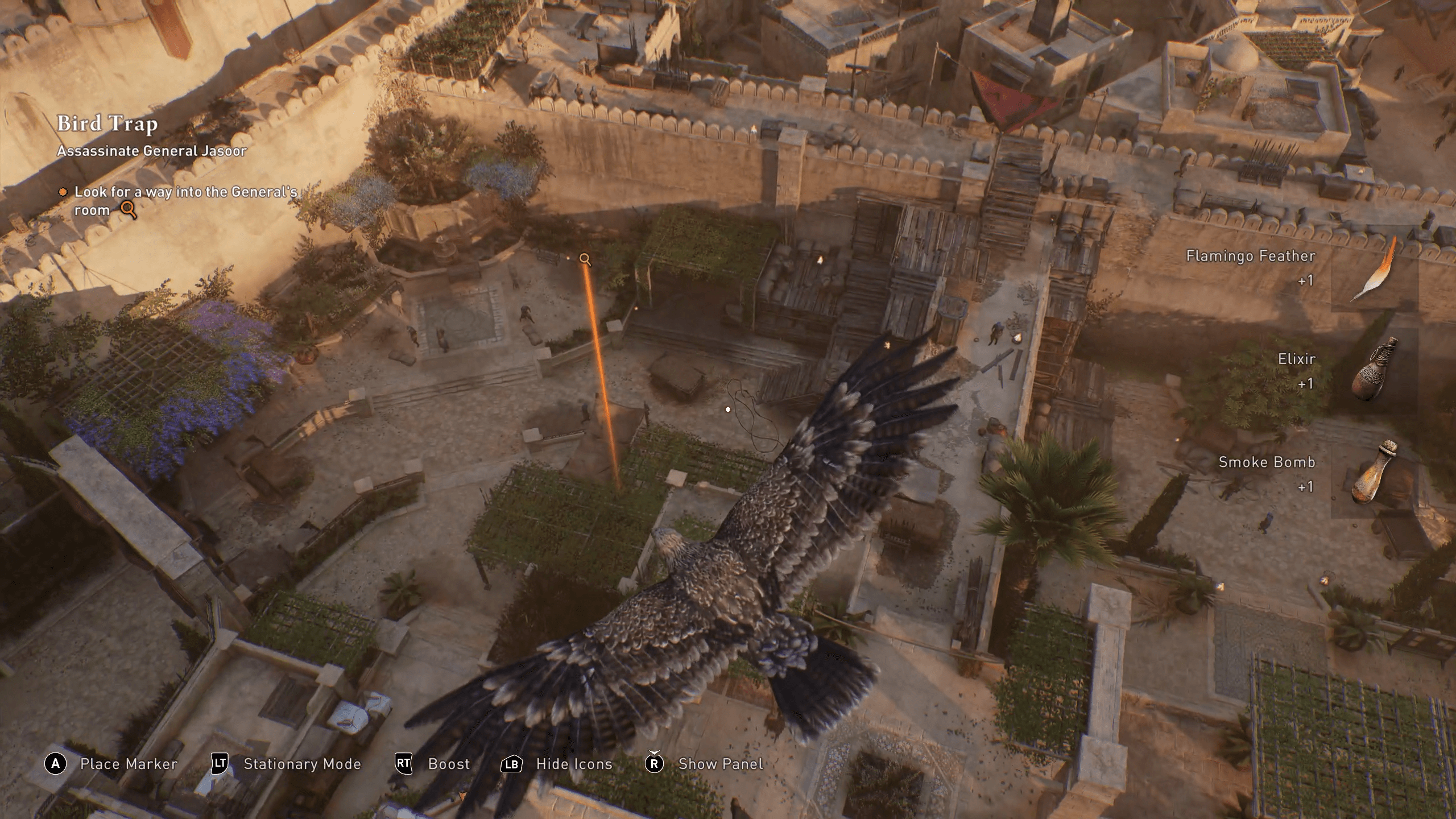

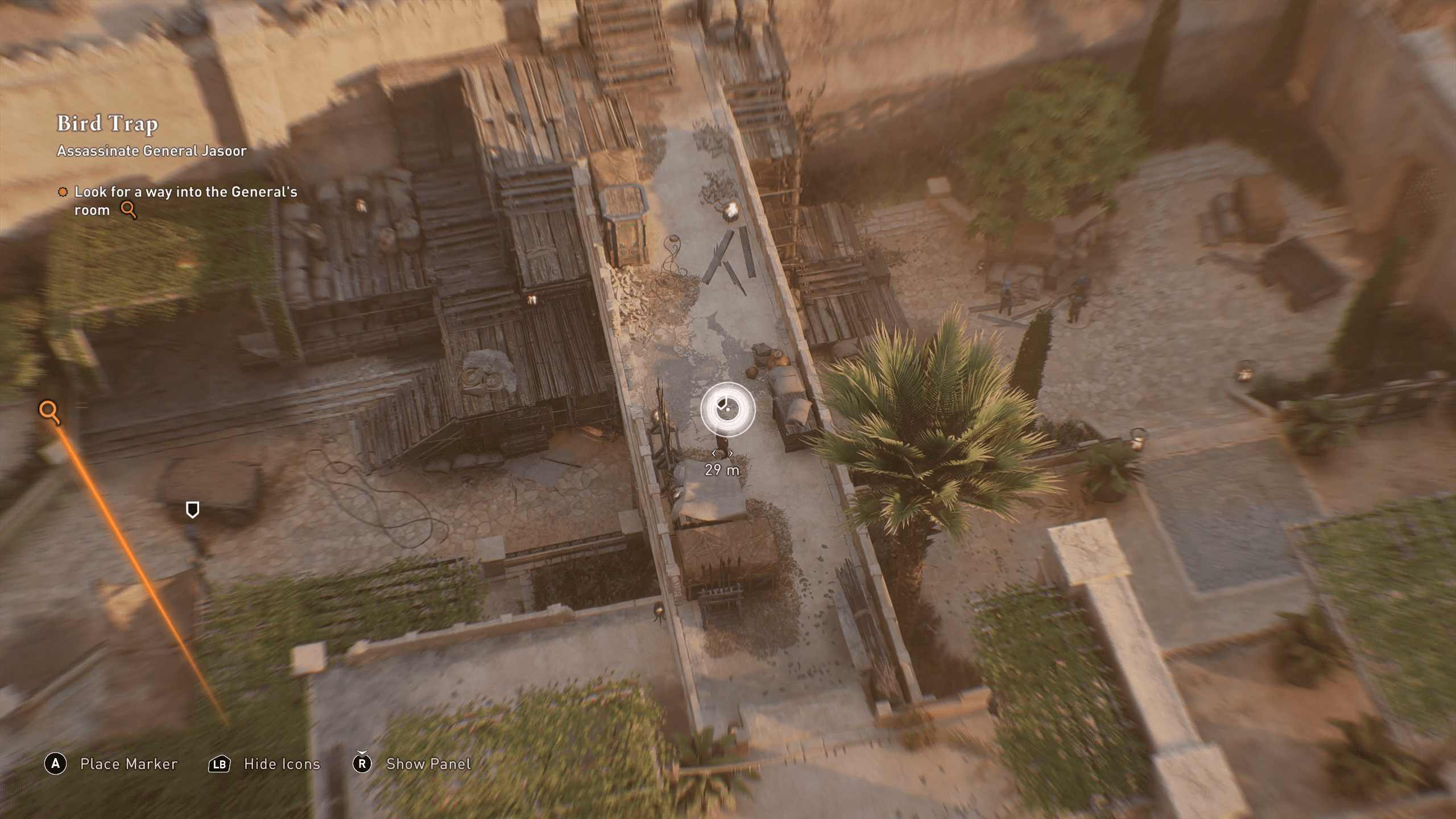
Outside of the gameplay itself the team really leans hard into the storytelling side of Mirage. There are a lot of cutscenes and that helps drive the plot forward. There are even these big cinematics before you embark on each big assassination mission and that helps set the stage for, what I would consider, are the biggest moments of the game. From a gameplay perspective I think the team gets this right on the money. These larger challenges are, for the most part, open-ended questions and you have to use your skills to figure out how you want to approach the situation. For me that usually meant climbing to the highest spot in the area and working my way down, killing guards, and removing obstacles in my path. That’s one approach, and the team gives you enough flexibility to tackle these however you want.
That’s augment even more by the introduction of favors, special coins that you can obtain to influence three distinct groups around Baghdad. This felt like a thinly veiled way to gamify one specific element of the ACM experience, and while it does pay off through shortcuts and distractions, it’s hardly a system that left a profound impact on me. To break it down you can pickpocket your way to getting special tokens and those tokens can be used to persuade mercenaries to fight for you, reduce the cost of goods at some shops, and create opportunities where none seem possible. It’s a means to an end and while it might not be the most elaborate system it works.
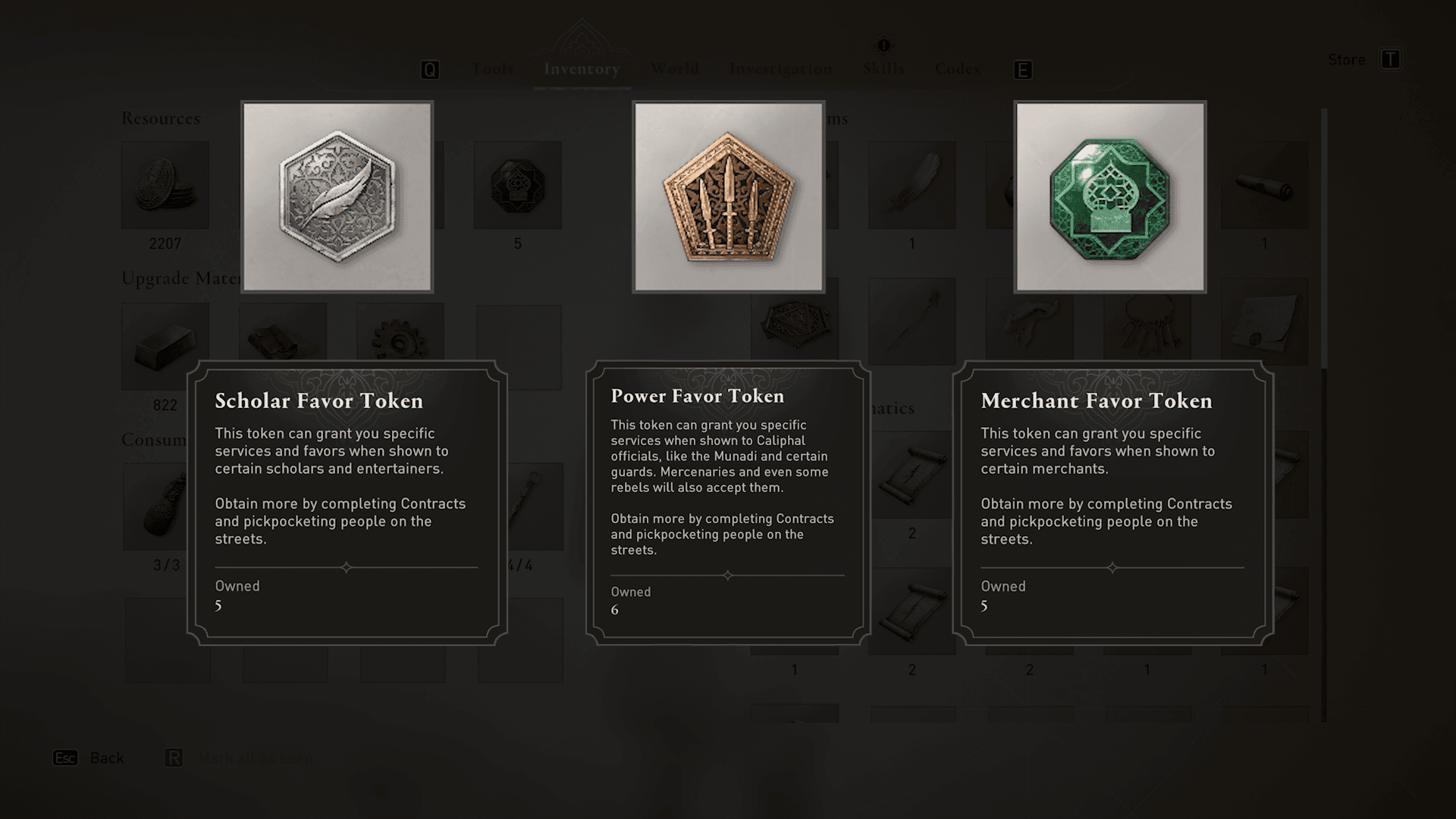
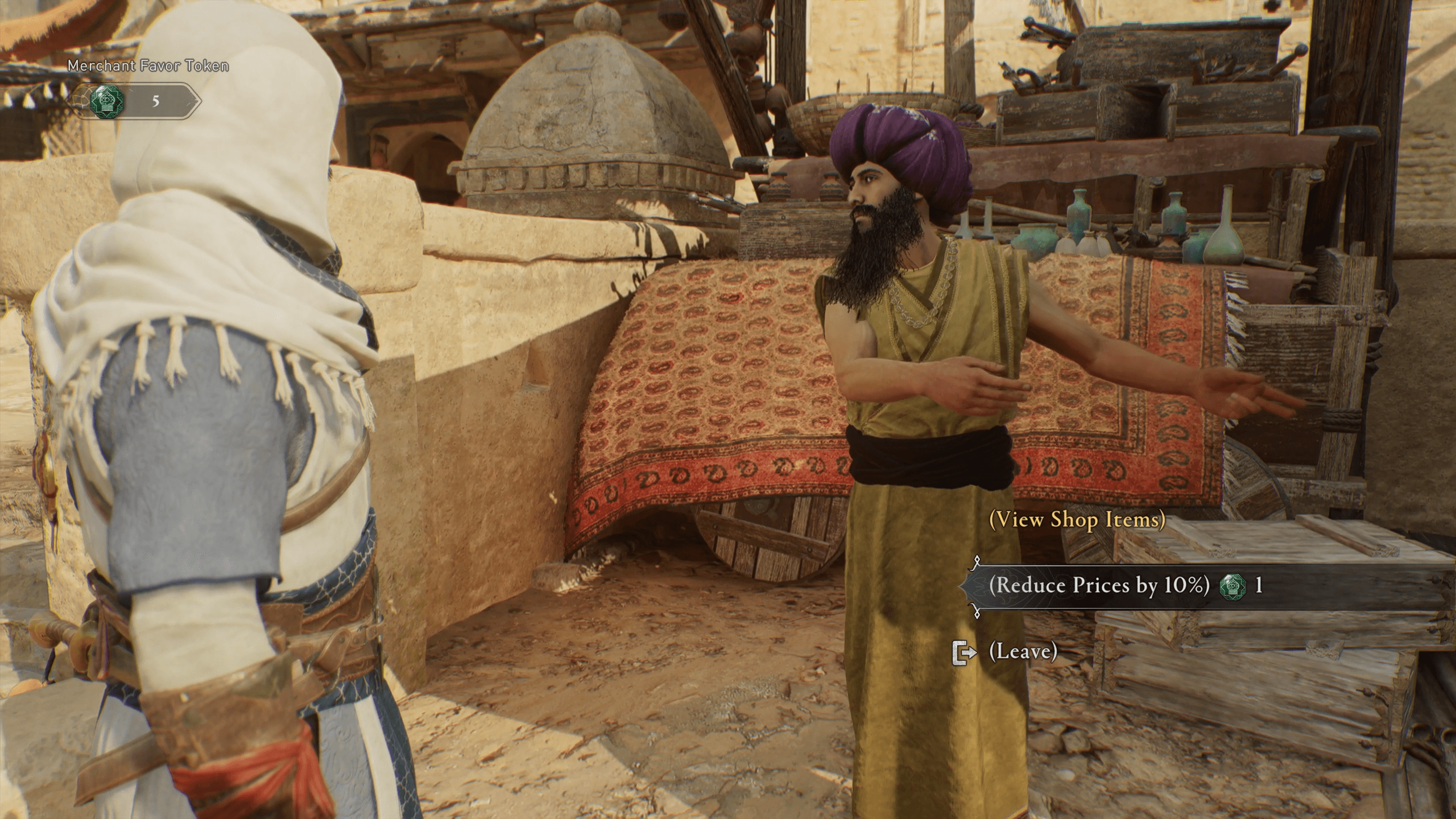
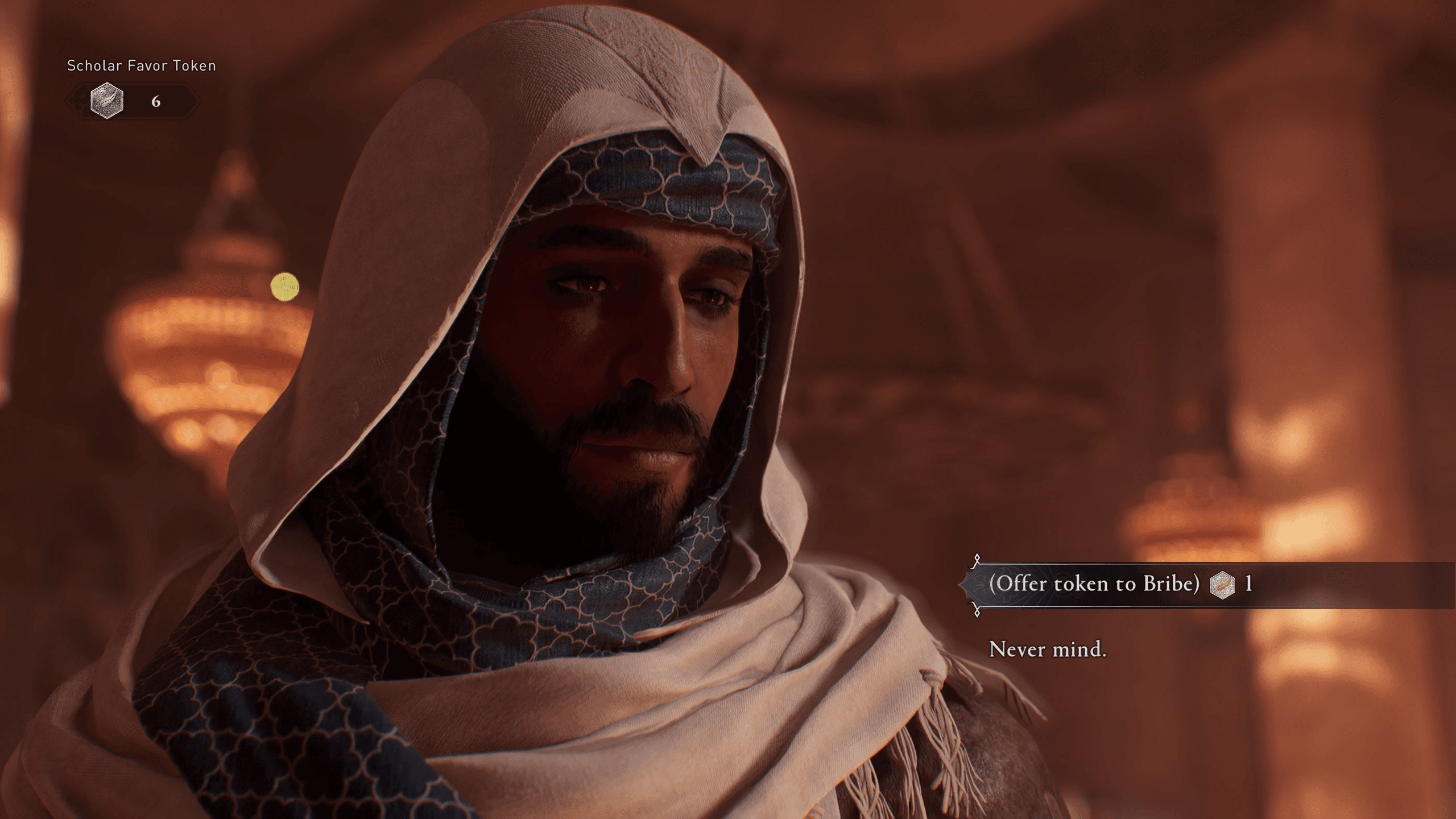
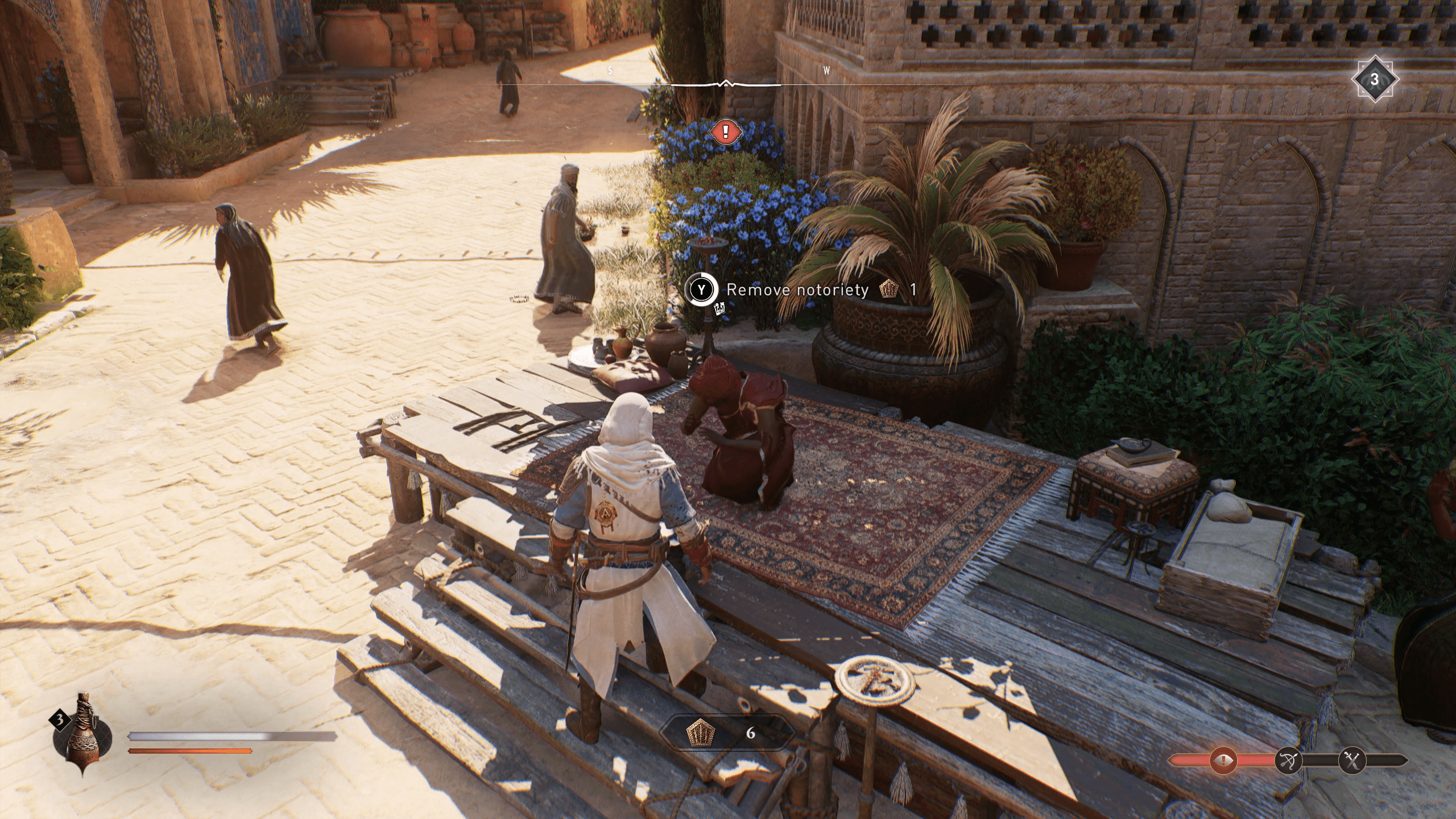
Where the experience really breaks down for me though is in the storytelling itself. The Order of the Ancient members are just not memorable and even now, sitting here writing this review, I couldn’t tell you their names, and I can only vaguely tell you why you should care about them. They’re the big bads of the world but they never really reach that potential. Instead the developers make the story all about Basim, and while that’s fine, it takes away from the real and persistent threat in the world. Take another Ubisoft villain, Vaas Montenegro and try to remember how he was presented in Far Cry 3. It’s a villain to truly be afraid of, and while Assassin’s Creed is different we never come close to achieving that level of character development outside of the Basim, our main character.
What this results in are major gameplay moments that I felt accomplished in completing, but not powerful or moving in any sort of way, because the threat of these Order of the Ancient members just never clicked for me. They were a step above vanilla and to me, the biggest miss of the entire game.
The Assassin’s Experience
Outside of some story fumbles I’ll admit I was all-in on the Assassin’s Creed Mirage gameplay experience. It really felt like the developers understood the assignment here, to create an Assassin’s Creed game that blends the best of the old with some of the new. Where this really comes into focus is the stealth-action combat, which is easily some of the best in the series, and that’s largely in part to the city of Baghdad itself. Narrow alleyways, crumbling walls, really anywhere you look there’s a place for you to lie in wait and that lends itself to some of the best stealth gameplay I’ve experienced in a long time. Is any of it new or innovative, not really, but it feels like the team finally nailed it after years of tweaking the formula.
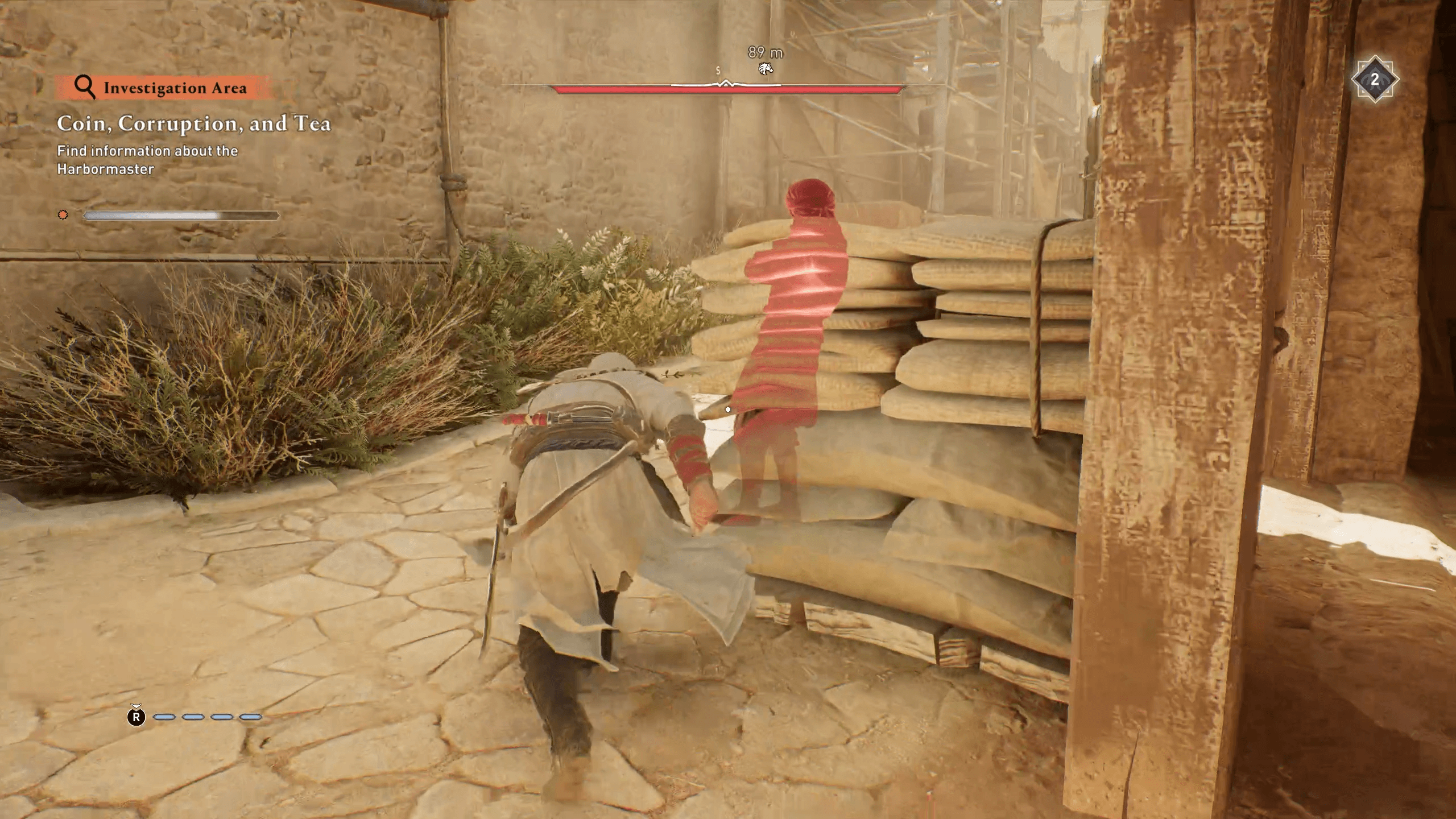
If things do go south and you end up in a true fight I think many will be happy to hear that the parry/instant-kill combination is back, and while I personally don’t think that’s the most engaging combat system, I know many harken back to yesteryears where they could simply parry and stab their way through a group of 30 guards. I prefer to use the game’s tools to help in those tricky situations. I think the array of knives, bombs, and other gadgets is a much more interesting way to engage and eliminate enemies and the team gives you enough flexibility through the upgrade system to make each of these stand out. My favorite tool, the smoke bomb, was my way of dealing with most complicated stealth situations and while that worked for me, some might have chosen a different tool to get the job done. Enough options are there to meet the demands of different playstyles, but if all else fails, or you just want to fight your way through everything, that system is there for you too.
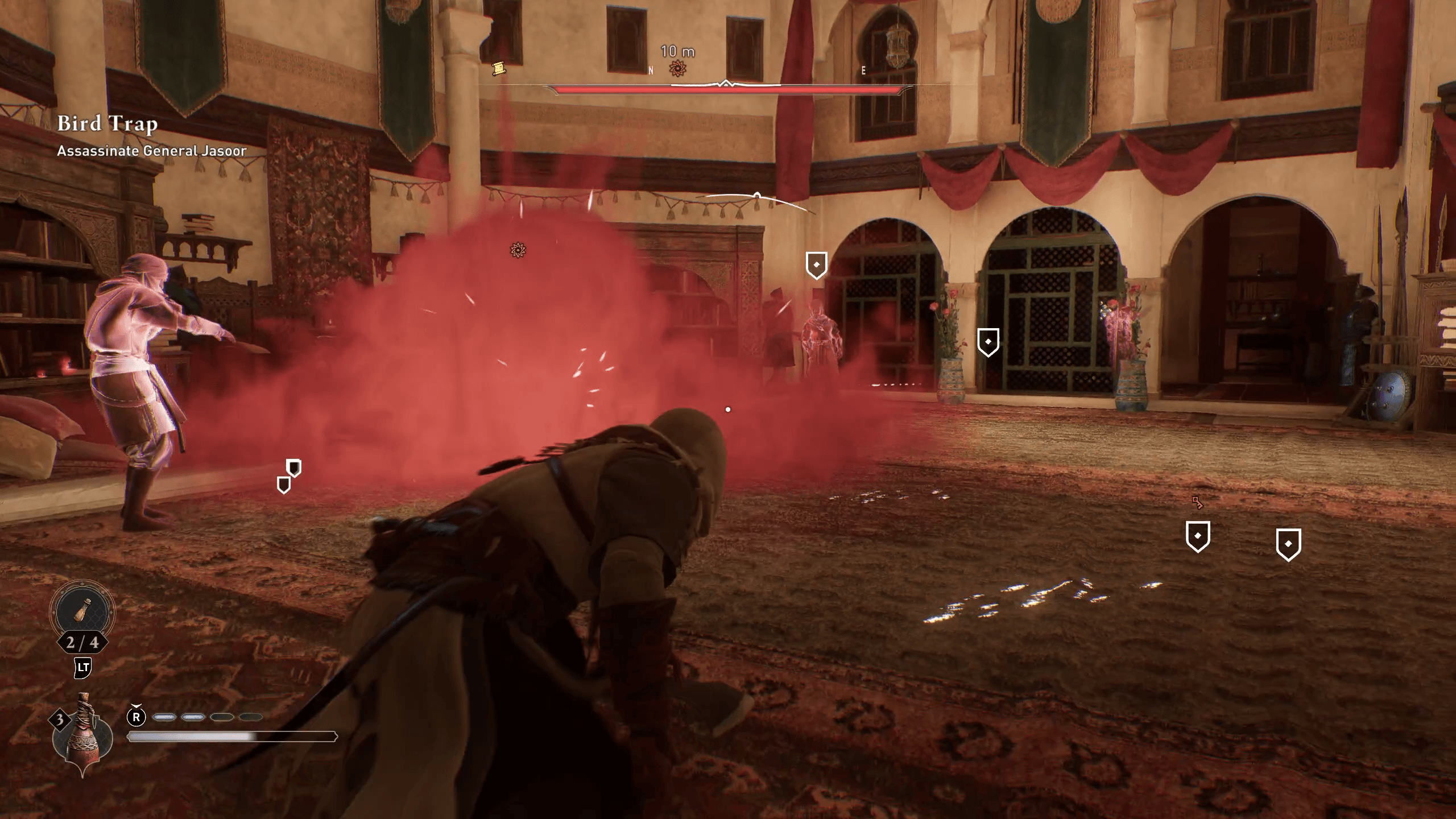
One standout feature, which I think many will consider an “easy mode” is the re-introduction of Assassin’s Focus which allows you to freeze time, select targets based on your available focus resource, and then initiate a mass chain of executions. Once I unlocked this system, those complicated sequences of multiple guards all standing relatively close together became a non-obstacle and really helped me get over that difficulty curve. This is the only time I felt like I was really stepping beyond the more grounded experience of Assassin’s Creed Mirage, but again if you don’t like that, you just don’t use it.
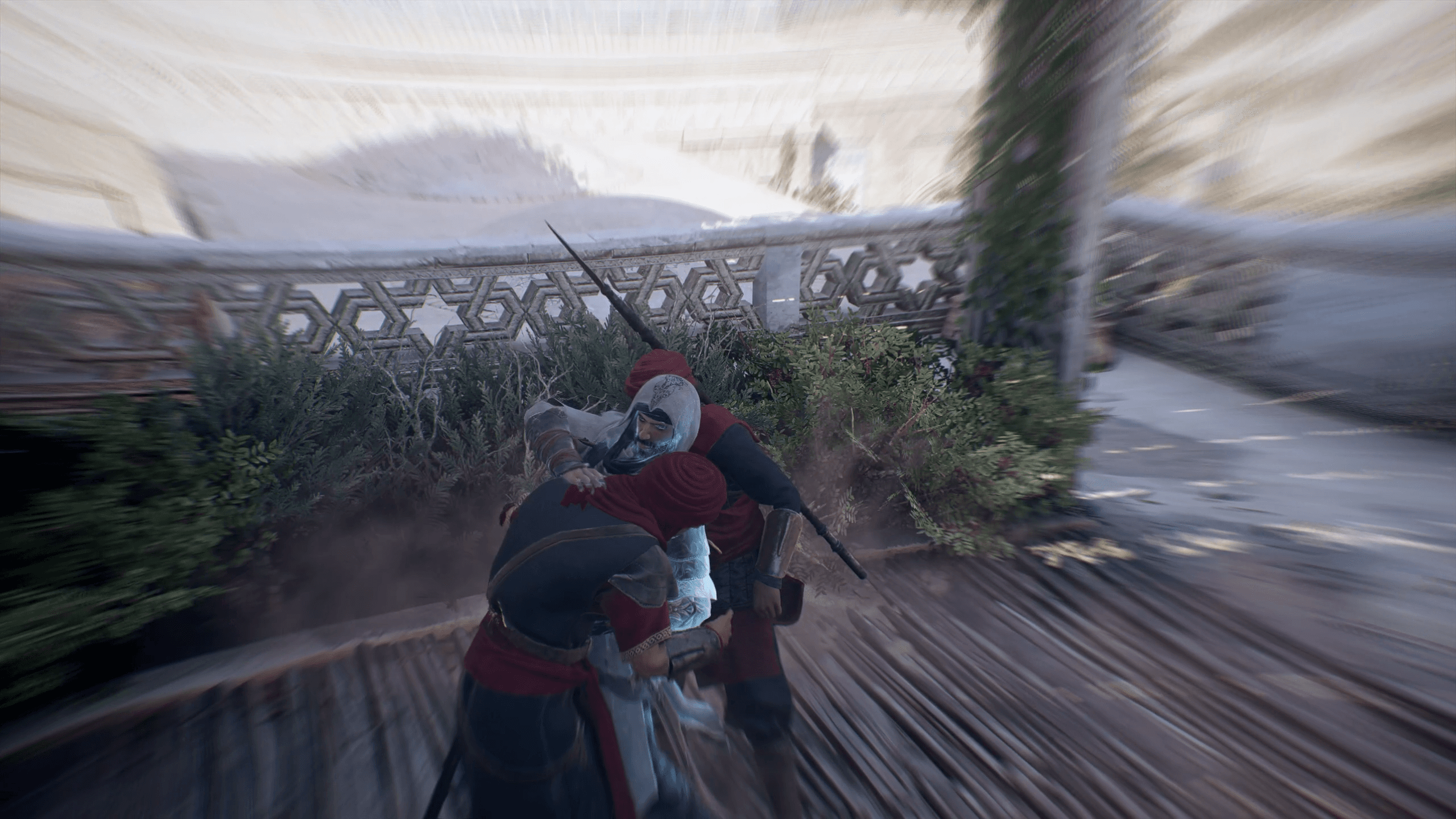
Another thing that felt at odds with this sort of return-to-form Assassin’s Creed experience was the gearing system. I’ll be honest with you guys, while I unlocked a bunch of gear throughout the game I never actually used anything other than the starting outfit, sword, and dagger, because there was no need to. I get it, coming from Valhalla where there are tons of weapons, and things to collect it’s cool to build out an arsenal, but when the gameplay loop revolves around sneaking and landing those one-shot blows I just didn’t care to constantly hunt down chests which took me away from the part of the game I was actually enjoying.
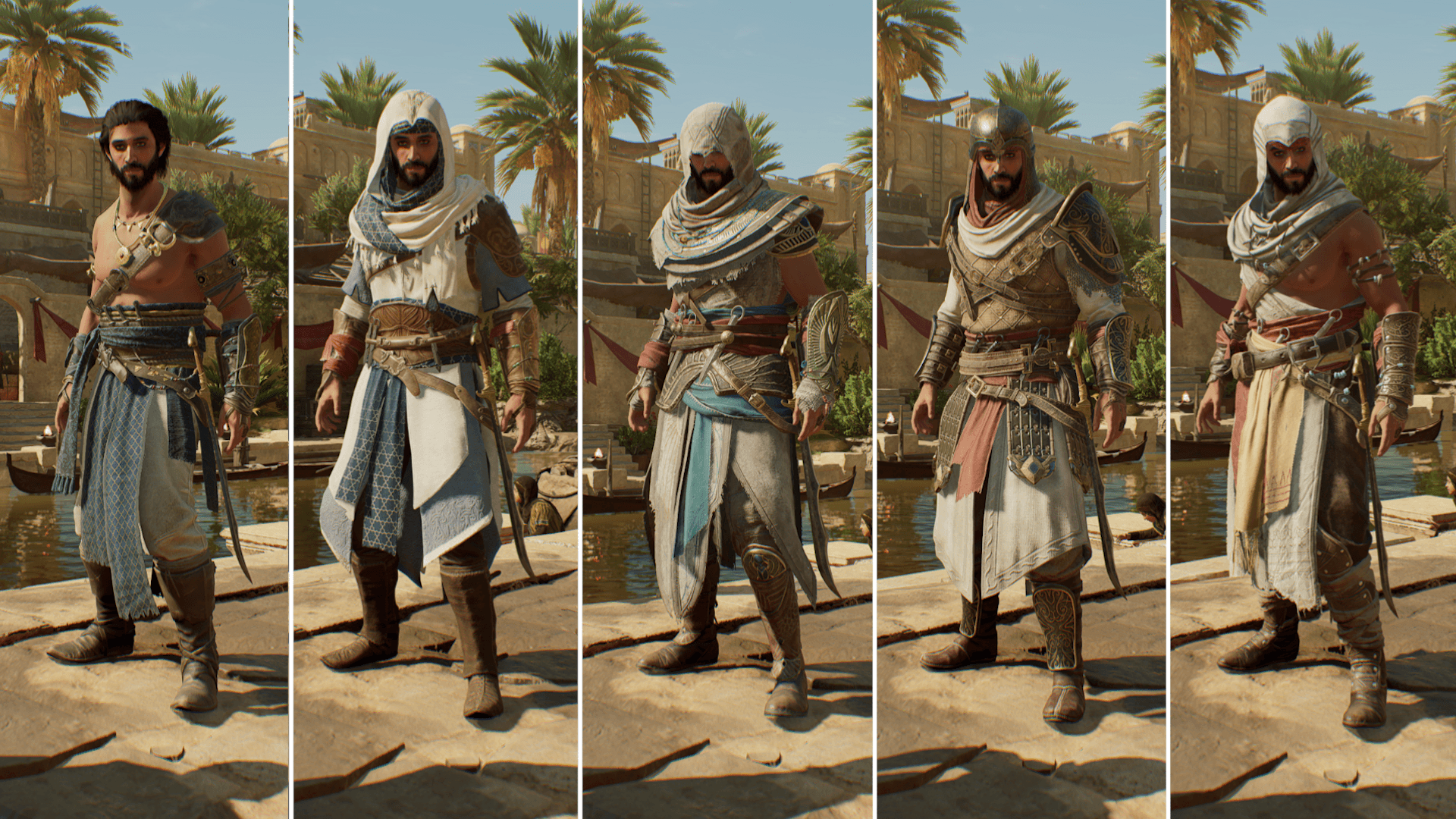
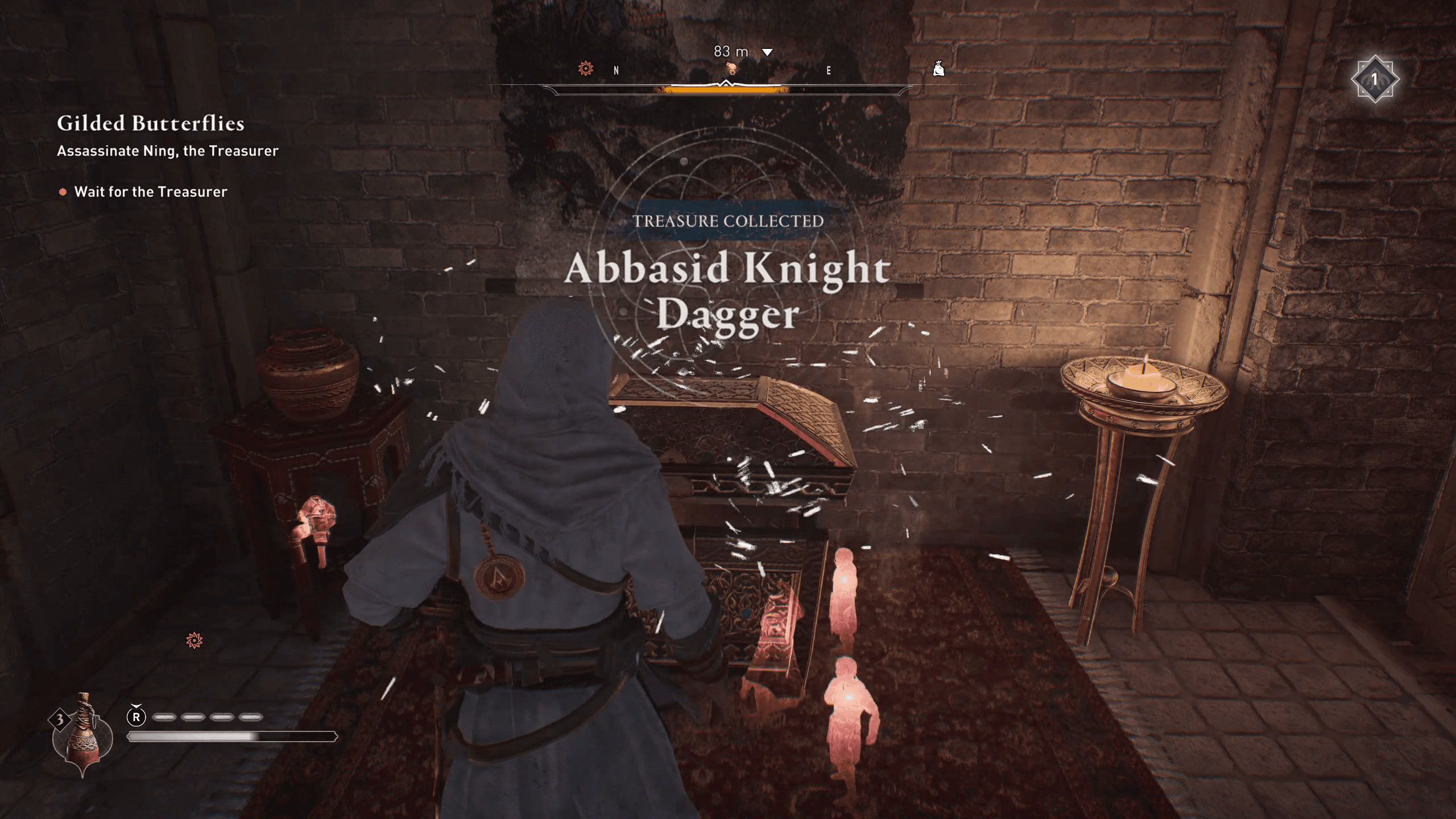
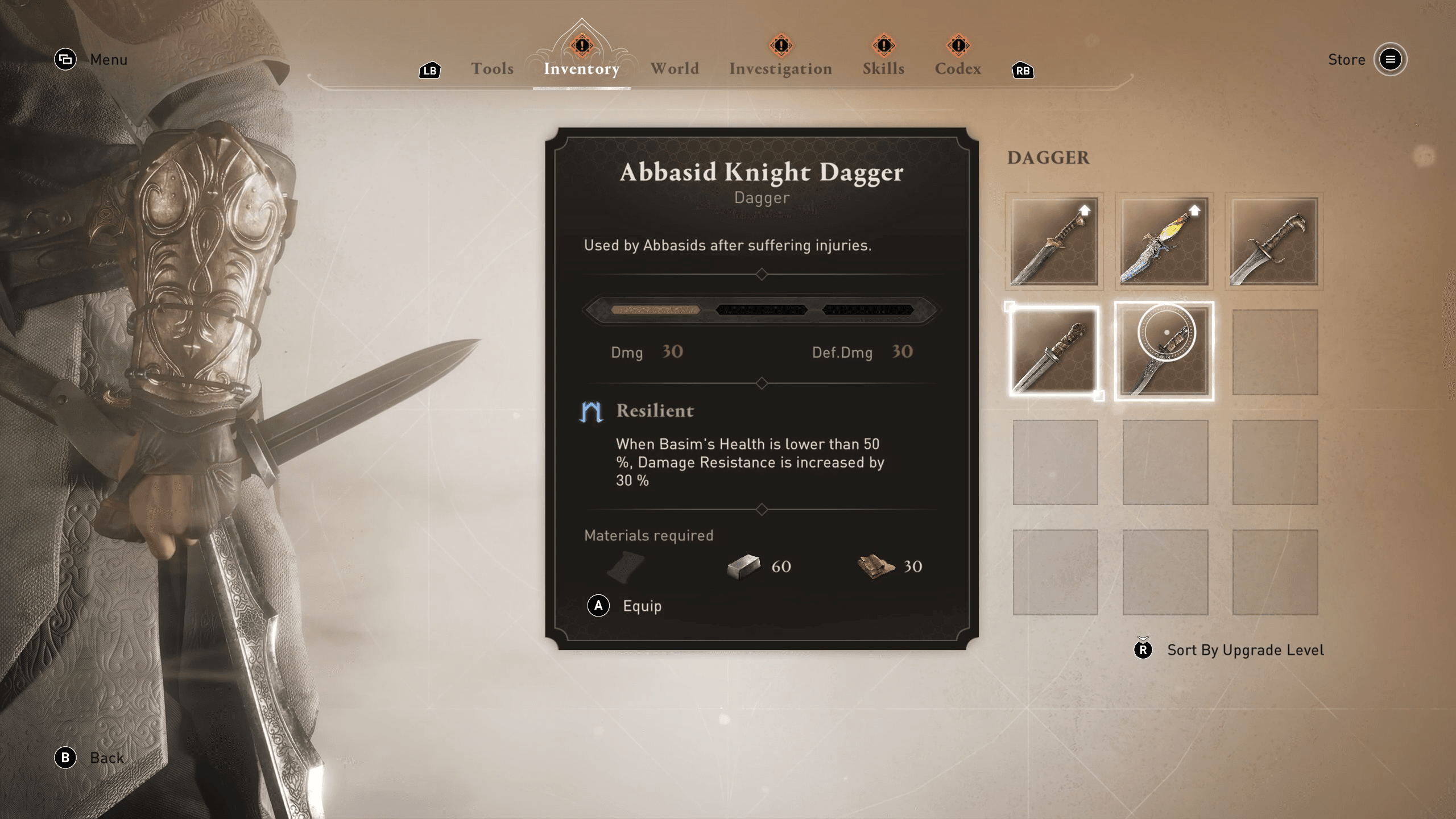
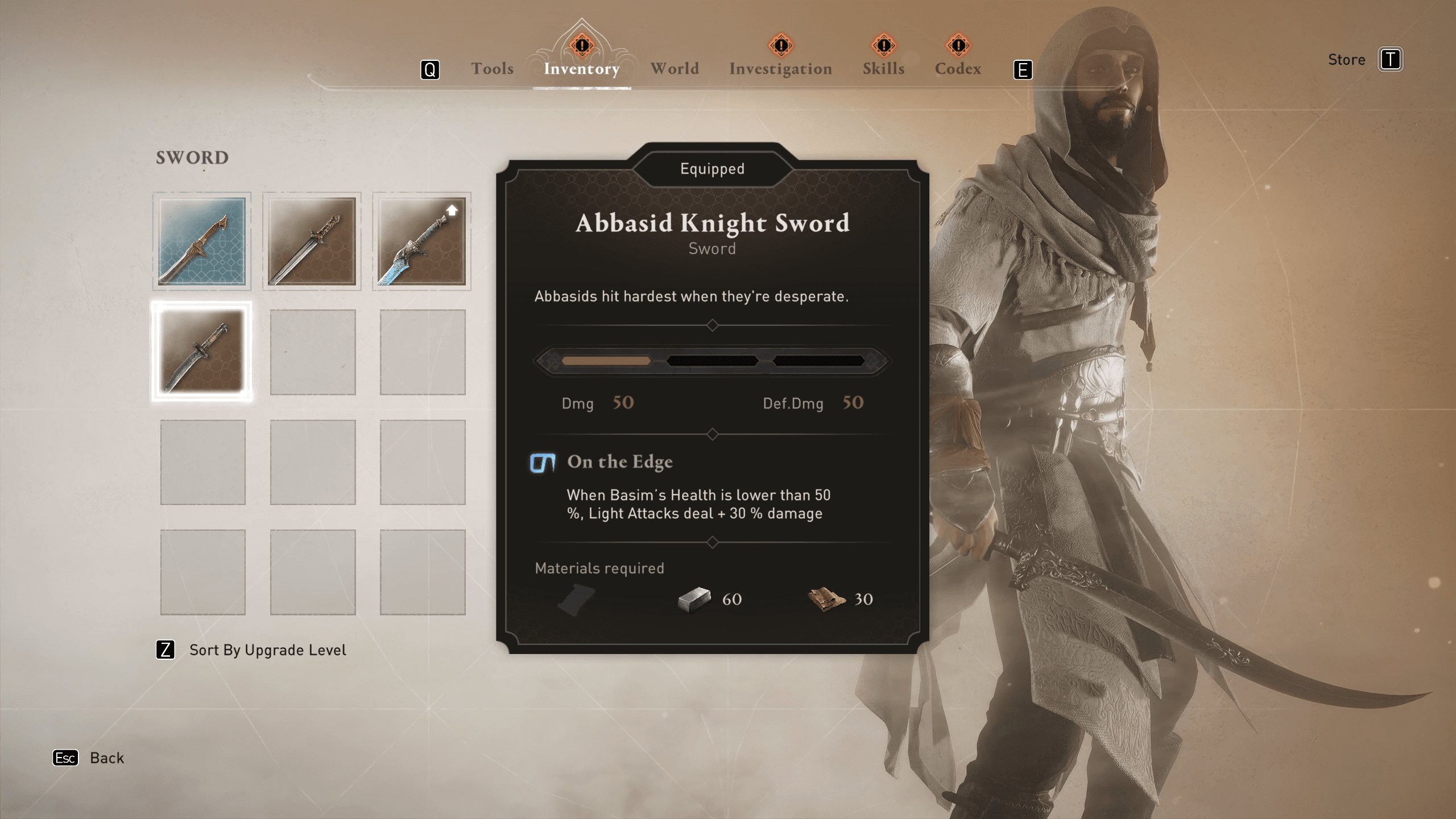
And I think that gets to the crux of my experience with Mirage. The main story, centered around Basim, is genuinely interesting. His journey from street rat to hidden one in training, all the way through his ascension as a master assassin was well told because it was laid out piece by piece. You were witnessing the evolution of the character in real time. Everything else that Assassin’s Creed historically throws at the player, all those side quests and outside “things” are just distractions, and that can often make the story moments feel disjointed. After exploring some of the basic side-content I chose to really focus my efforts on advancing the story because it was clear that’s where the game was pushing me. Sure, unlocking a new dye theme for my gear is cool, but not if it pulls me away from what is actually engaging about the game, the story-adventure.
The Bottom Line
Assassin’s Creed Mirage gets a lot right, and for the first time in a while it feels like the series is back on the right track, tapping into the things that made it great in the first place. As I said before it’s a blending of old and new ideas and that creates an experience that, for the most part, feels complete. Going into the game I want you to realize that Mirage is a smaller game, and the story will run you around 15-20 hours, if that’s all you focus on. If you get distracted with side content, or just tend to play games slower than you might be able to expand that closer to 35-40. It really depends on your pace of play.
There’s also no forced end-game experience. Once you beat the main story you’re teleported back right before the final chapter and can continue exploring Baghdad and completing any other content you want, but there is no end-game loop present at this time. Let me be clear, that’s perfectly fine and I think a system like that would cheapen the experience, and most likely weigh down an otherwise great game.
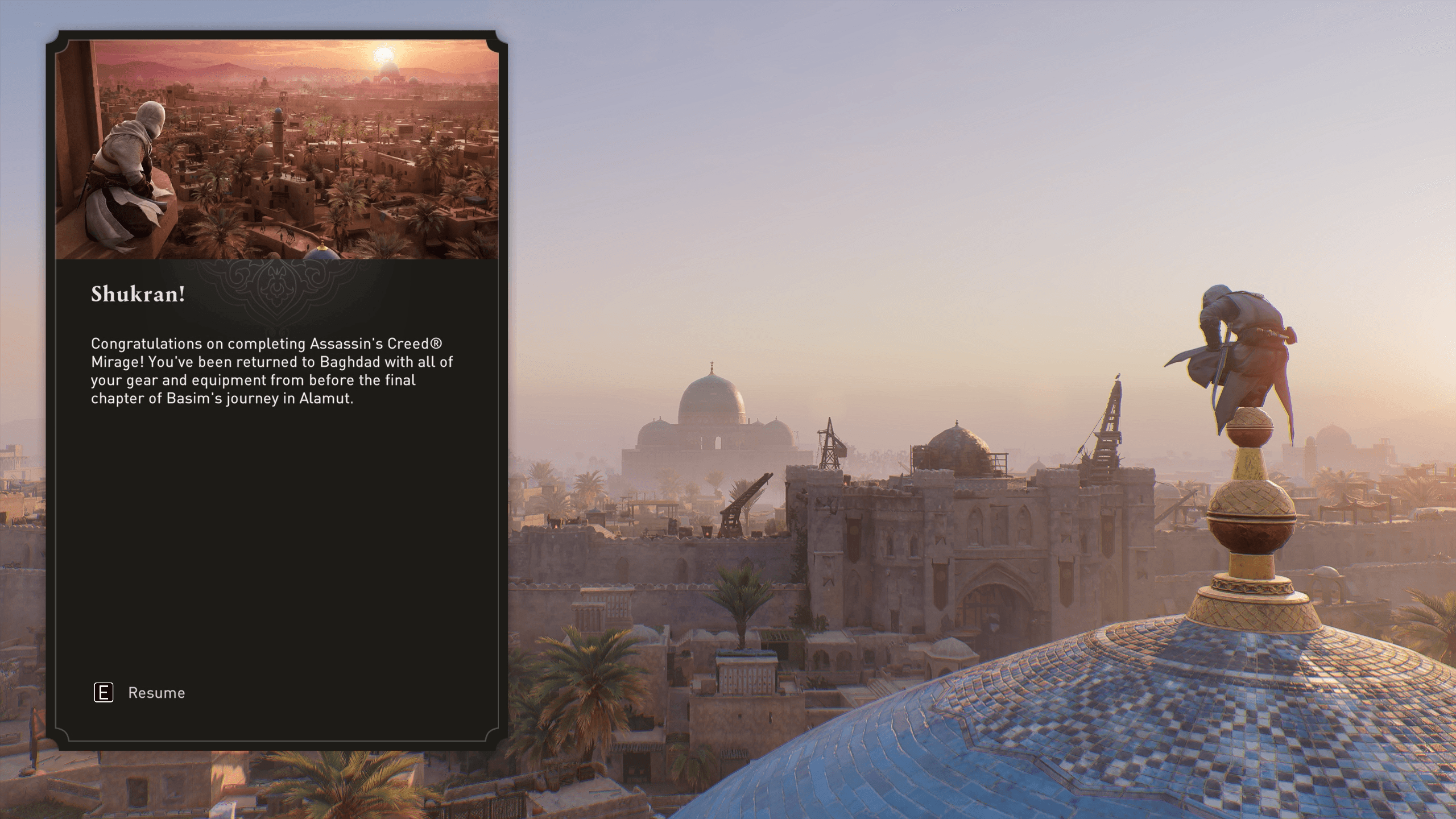
Much like with Valhalla there’s also a store. Ubisoft is never one to miss an opportunity to monetize the experience and just like previously players can scoop up full sets of gear, which include outfits and weapons, as well as mount skins, and maps that reveal the location of side content. As always items in the store look cool, but there’s nothing here you need to purchase. Shop items won’t fundamentally change the gameplay experience so make of that what you will.
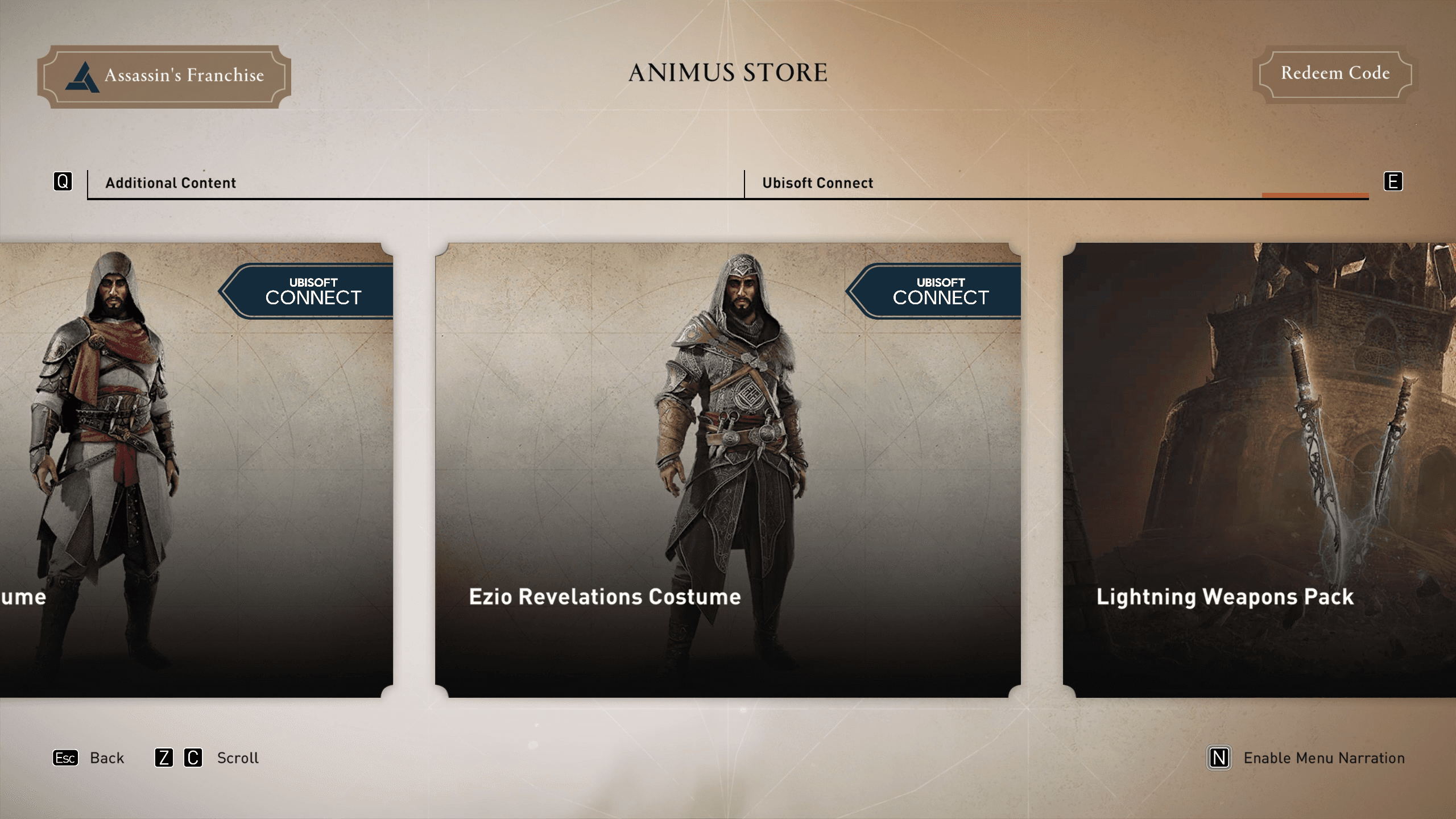
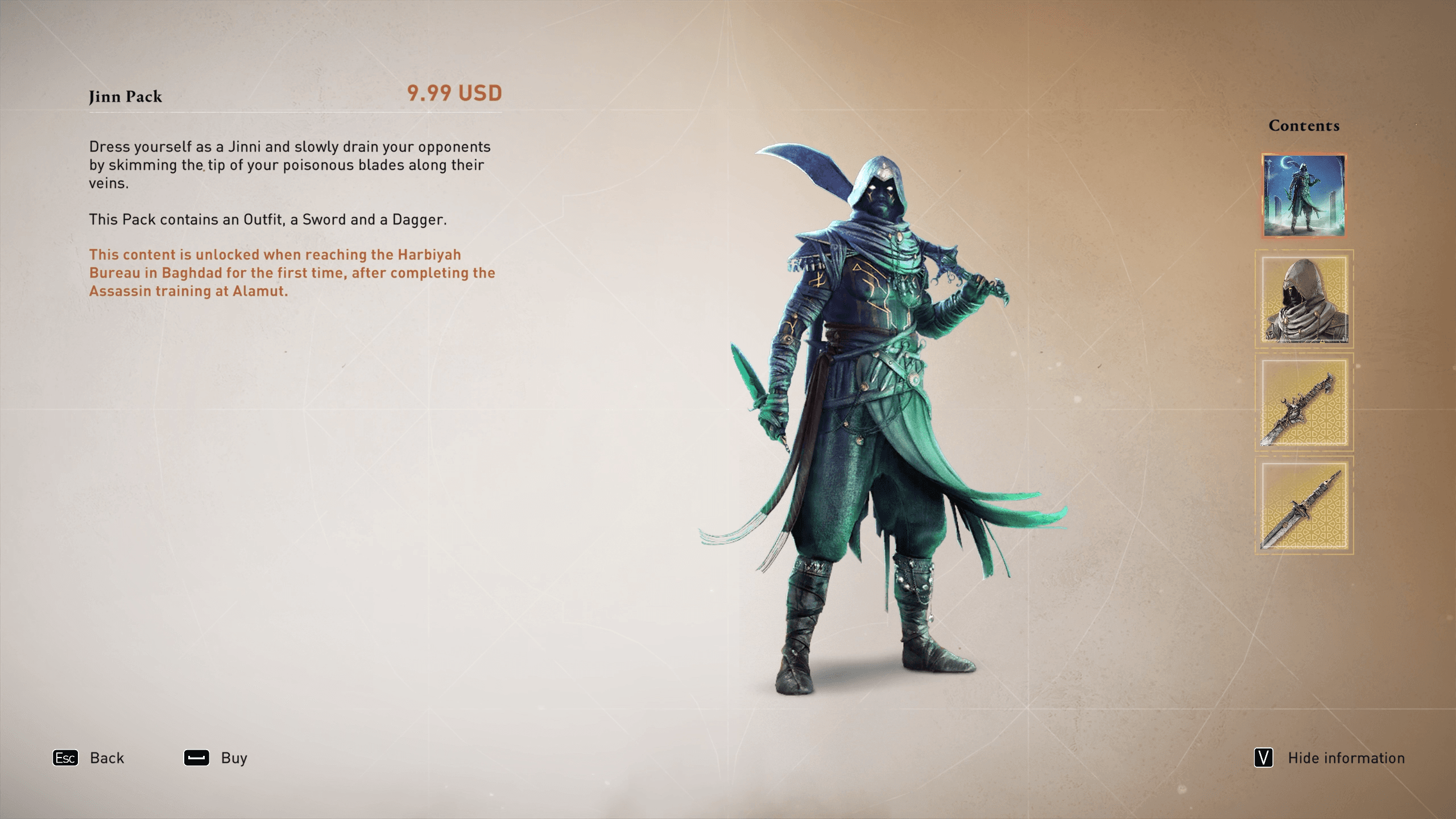
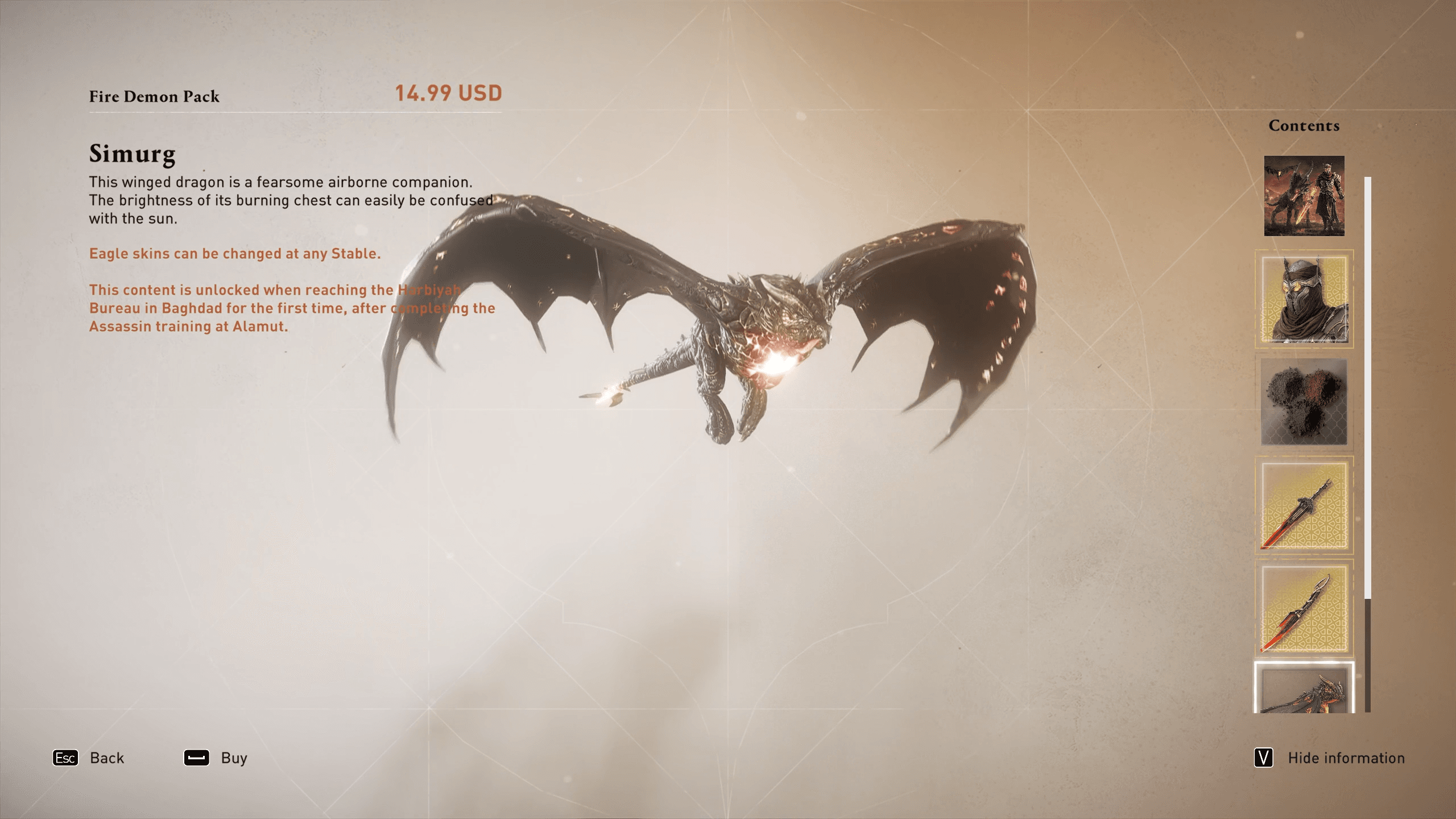
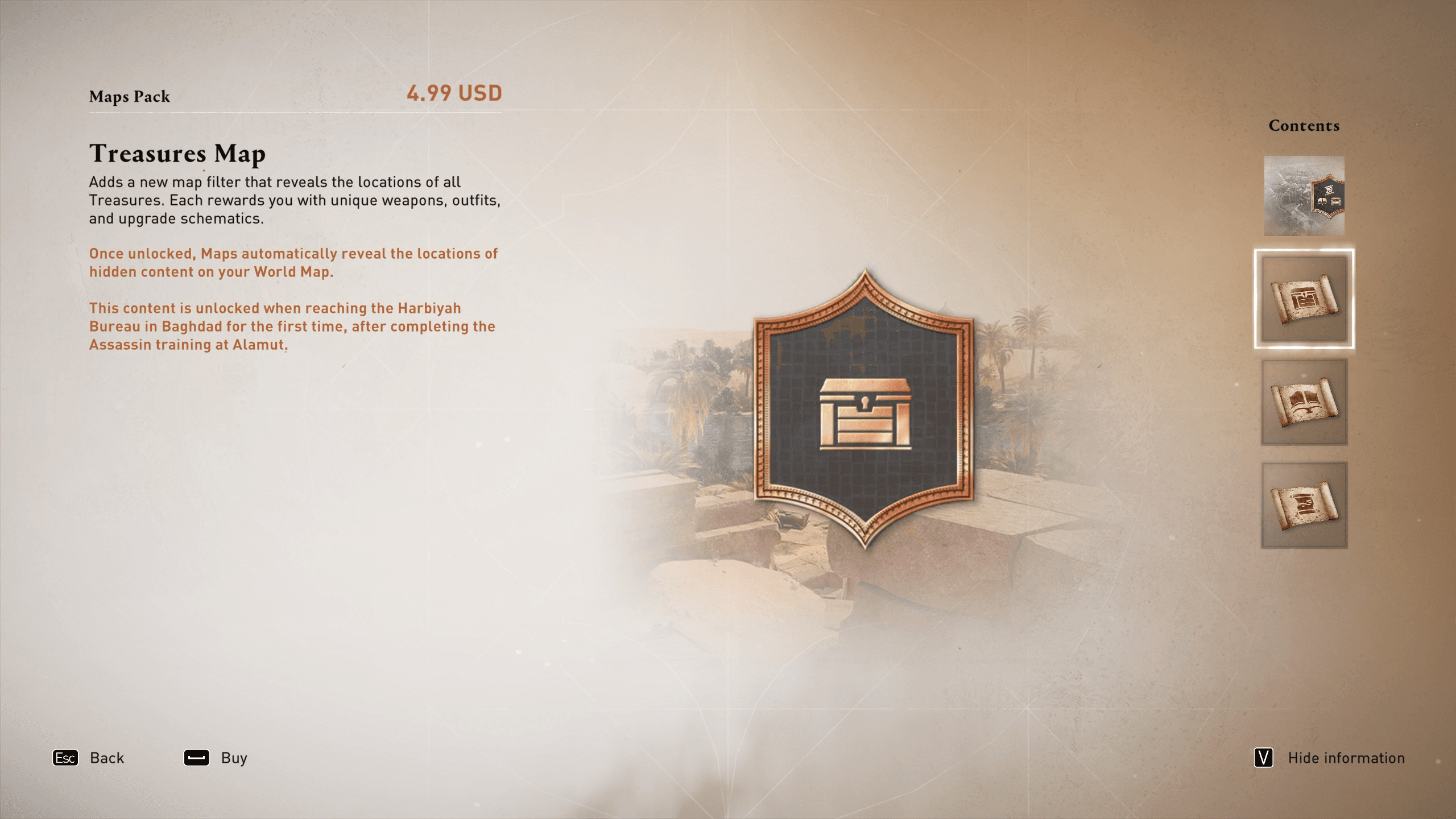
Based on my experience I’m pretty comfortable saying Ubisoft got the execution of Assassin’s Creed Mirage right. The beautiful city of Baghdad felt dense and alive, offering plenty of places to run, hide, and kill. The return to more action-stealth gameplay was exactly what the series needed, and if you lean into that as a player, you’ll experience the game as it was intended to be played. There’s flexibility in how you approach each situation and the real value recon re-introduces to the series adds just enough depth to help round out the gameplay side of things.
That being said, Mirage is story driven and Basim, for the most part, anchors the entire narrative. He’s an interesting character, fighting his own demons and it’s cool to look back at someone that was introduced in Valhalla and experience his origin story. Sadly, Basim alone can’t anchor the Assassin’s Creed Mirage story and even with incredible actresses like Shohreh Aghdashloo lending their talents to the game there’s not enough meaningful character development outside the Hidden Ones that got me to invest full-bore. The use of cinematics and cutscenes felt more like a return-to-form for the game, but it doesn’t replace the need to develop interesting characters and tell meaningful stories.
If you’re one of the players that has been longing for the series to get back to its roots of climbing across rooftops and dropping down to take out clueless guards, then I think you’ll have a wicked good time with the game regardless if the story doesn’t hit at every juncture.






